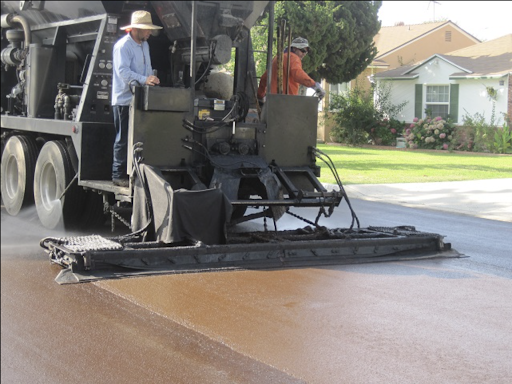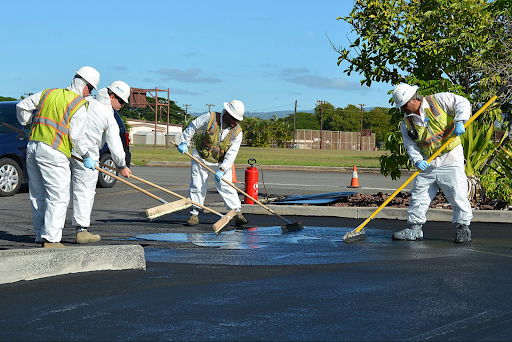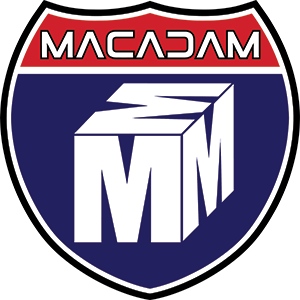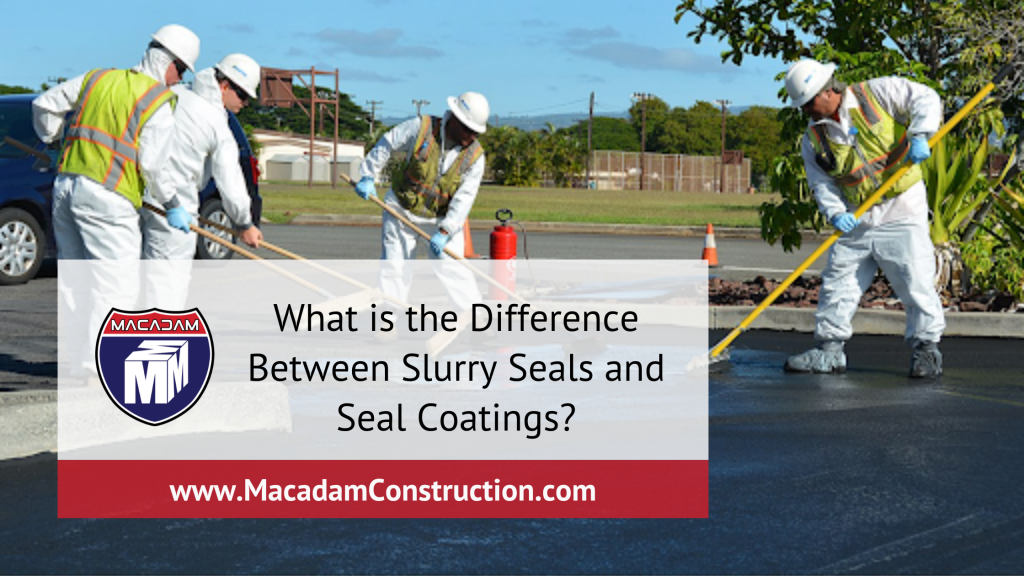
What is the Difference Between Slurry Seals and Seal Coatings?
What is the difference between slurry seals and seal coatings?
Maintaining the longevity and smoothness of pavement is a critical aspect of managing infrastructure for any property owner, manager or city. Two common methods of preserving asphalt surfaces are slurry seals and seal coatings. Both techniques involve applying a thin layer of protective material to the pavement, but they differ in their composition and application. It is important to understand the differences between the two options to make an informed decision about which one is best suited for a particular project. In this article, we will explain what each method is, their advantages, and help you determine which option is most appropriate for your pavement maintenance needs.
What is a slurry seal?
Slurry seals are a mixture of asphalt emulsion, fine aggregate, and mineral filler that are used to protect and maintain pavement surfaces. This method of pavement preservation is commonly used in road construction projects to prevent premature pavement deterioration and to prolong the life of asphalt surfaces. Slurry seals are typically applied to surfaces that have slight cracking or oxidation to prevent further damage.
The process of slurry sealing involves preparing the pavement surface by cleaning it thoroughly and filling any cracks or gaps with a hot rubberized material. Next, the slurry mixture is spread evenly over the surface using a specialized machine, which coats the pavement with a thin layer of the mixture. The mixture is then left to cure and harden, providing a protective layer that helps to reduce water penetration and prevent further damage from occurring.
One of the main benefits of slurry seals is their cost-effectiveness. Compared to other road construction techniques, slurry seals are relatively inexpensive and can be applied quickly with minimal disruption to traffic flow. They also provide a skid-resistant surface, which improves safety for both pedestrians and vehicles. Overall, slurry seals are an effective way to maintain and preserve pavement surfaces, providing a long-lasting protective layer that helps to extend the life of the pavement.

What are the benefits of a slurry seal?
Slurry seals provide numerous benefits for pavement surfaces. Here are some of the key advantages:
- Cost-effective: One of the primary benefits of slurry seals is that they are a cost-effective pavement preservation solution. Compared to other road construction techniques, slurry seals are relatively inexpensive and can extend the life of a pavement surface for several years.
- Water-resistant: Slurry seals provide a water-resistant surface, which helps to prevent water from penetrating the pavement and causing damage. This is particularly important in areas with high rainfall or where the pavement is prone to cracking due to freeze-thaw cycles.
- Improved skid resistance: The texture of a slurry seal provides a skid-resistant surface, which improves safety for both pedestrians and vehicles. This is especially important for roads and highways where traffic speeds are high.
- Prevents further damage: Applying a slurry seal to a pavement surface can help to prevent further damage, such as cracking or potholes, from occurring. It is an effective way to maintain the integrity of a pavement surface and prevent the need for costly repairs down the line.
- Quick application: Slurry seals can be applied quickly with minimal disruption to traffic flow. This means that road closures can be kept to a minimum, reducing the impact on drivers and local businesses.
Overall, slurry seals are an excellent choice for pavement preservation and can provide a cost-effective, long-lasting solution for maintaining asphalt surfaces.
Who would use a slurry seal?
Slurry seals are commonly used by a variety of different entities, including municipalities, property managers, and private businesses. Municipalities often use slurry seals as part of their routine road maintenance program to extend the life of their roadways and prevent costly repairs. Property managers may use slurry seals to maintain the surfaces of parking lots, driveways, and sidewalks on their properties. Private businesses may also use slurry seals to maintain their parking lots and driveways, improving safety and preventing damage.
Slurry seals are particularly useful for extending the life of asphalt pavement in areas with high traffic volume, such as parking lots, streets, and highways. They can also be used to improve the safety of pedestrian areas, such as sidewalks and bike paths. Overall, anyone who is responsible for maintaining pavement surfaces can benefit from using a slurry seal as part of their pavement maintenance program. By preventing further damage and extending the life of the pavement, slurry seals can help to save money in the long run and improve safety for all users of the road or pavement.
What is a Seal Coating?
Seal coatings are an effective way to protect and maintain asphalt pavement surfaces. They are a thin layer of material that is applied to the surface of the pavement to provide a protective barrier against damage from water, sunlight, and other environmental factors. Seal coatings are typically made from a mixture of asphalt emulsion, water, and various additives, such as sand, polymers, or fibers. These materials are combined to create a viscous liquid that is applied to the surface of the pavement.
The application of a seal coating involves first preparing the pavement surface by cleaning it thoroughly and filling any cracks or gaps with a hot rubberized material. Next, the seal coating mixture is applied to the surface using a specialized machine, which ensures an even and consistent application of the coating. The coating is then left to cure and harden, providing a protective layer that helps to prevent further damage and deterioration of the pavement surface.
The benefits of using a seal coating on pavement surfaces are numerous. Seal coatings are an affordable option for protecting and maintaining asphalt pavement surfaces. They help to extend the life of the pavement by preventing damage from water and other environmental factors. Additionally, seal coatings can improve the appearance of the pavement surface, giving it a uniform, black finish. Seal coatings are a popular choice for both residential and commercial properties, as they can be used to protect driveways, parking lots, and other paved surfaces.

What are the Benefits of a Seal Coating?
Seal coatings provide a number of benefits for pavement surfaces, including:
- Protection from weather and environmental damage: Seal coatings provide a barrier against damage from sunlight, water, and other environmental factors. This helps to prevent the pavement from cracking, fading, and deteriorating, extending the life of the surface.
- Cost-effective maintenance: Applying a seal coating is an affordable way to maintain the appearance and integrity of pavement surfaces. It is much less expensive than full pavement replacement and can prevent the need for more costly repairs down the line.
- Improved appearance: Seal coatings give pavement surfaces a uniform, black finish, which can greatly improve the appearance of driveways, parking lots, and other paved surfaces. This can be especially important for commercial properties, where a well-maintained appearance can help to attract customers.
- Increased safety: Seal coatings provide a skid-resistant surface, which improves safety for both pedestrians and vehicles. This is especially important for high-traffic areas, such as parking lots and driveways.
- Easy application: Seal coatings can be applied quickly and with minimal disruption to traffic flow. This means that road closures can be kept to a minimum, reducing the impact on drivers and local businesses.
Overall, seal coatings are an excellent choice for maintaining the appearance and integrity of pavement surfaces. They provide a cost-effective solution for protecting against weather and environmental damage, improving safety, and extending the life of the pavement.
Who would use a seal coating?
Seal coatings provide a number of benefits for pavement surfaces, including:
- Protection from weather and environmental damage: Seal coatings provide a barrier against damage from sunlight, water, and other environmental factors. This helps to prevent the pavement from cracking, fading, and deteriorating, extending the life of the surface.
- Cost-effective maintenance: Applying a seal coating is an affordable way to maintain the appearance and integrity of pavement surfaces. It is much less expensive than full pavement replacement and can prevent the need for more costly repairs down the line.
- Improved appearance: Seal coatings give pavement surfaces a uniform, black finish, which can greatly improve the appearance of driveways, parking lots, and other paved surfaces. This can be especially important for commercial properties, where a well-maintained appearance can help to attract customers.
- Increased safety: Seal coatings provide a skid-resistant surface, which improves safety for both pedestrians and vehicles. This is especially important for high-traffic areas, such as parking lots and driveways.
- Easy application: Seal coatings can be applied quickly and with minimal disruption to traffic flow. This means that road closures can be kept to a minimum, reducing the impact on drivers and local businesses.
Overall, seal coatings are an excellent choice for maintaining the appearance and integrity of pavement surfaces. They provide a cost-effective solution for protecting against weather and environmental damage, improving safety, and extending the life of the pavement.
The differences between slurry seals and seal coatings:
While both slurry seals and seal coatings are used for pavement maintenance and protection, there are several key differences between the two.
- Application method: Slurry seals are typically applied in a much thicker layer than seal coatings, using specialized equipment that spreads the slurry mixture evenly over the pavement surface. Seal coatings, on the other hand, are applied in a much thinner layer using a spray or squeegee method.
- Material composition: Slurry seals are typically made from a mixture of emulsified asphalt, aggregate, and additives, such as polymers or fibers. This creates a thicker, more durable layer that can fill in small cracks and provide better protection against damage. Seal coatings are typically made from a mixture of asphalt emulsion, water, and additional additives, such as sand or polymers. This creates a thinner layer that is better suited for filling in small cracks and protecting against weather and environmental damage.
- Durability: Slurry seals are generally more durable than seal coatings, due to their thicker layer and the use of aggregate in the mixture. This makes them better suited for high-traffic areas and heavy use. Seal coatings are less durable, but are still effective for protecting against weather and environmental damage.
- Cost: Slurry seals are generally more expensive than seal coatings, due to the additional materials and equipment required for their application. Seal coatings are a more affordable option for pavement maintenance and protection, making them a popular choice for homeowners and smaller businesses.
- Suitable applications: Slurry seals are better suited for larger paved areas, such as roadways, highways, and airports, where heavy use and high traffic can cause significant damage. Seal coatings are more suitable for smaller areas, such as driveways, parking lots, and sidewalks, where the wear and tear is less severe.
In summary, while both slurry seals and seal coatings are effective for pavement maintenance and protection, they are suited to different applications. Slurry seals are better suited for larger, high-traffic areas where durability is critical, while seal coatings are better suited for smaller areas where cost and ease of application are more important considerations. Ultimately, the choice between the two will depend on the specific needs of the pavement surface being maintained.
Which is right for you ?
Determining whether a slurry seal or seal coating is the right choice for your pavement maintenance needs depends on several factors. Here are a few considerations to keep in mind:
- Size of the paved area: If you have a large paved area, such as a roadway or parking lot, a slurry seal may be the better choice. The thicker layer of material provides more durable protection against heavy traffic and wear and tear.
- Budget: Slurry seals are generally more expensive than seal coatings due to the additional materials and equipment required for their application. If budget is a concern, seal coatings may be a more affordable option for smaller paved areas, such as driveways or sidewalks.
- Maintenance schedule: Slurry seals generally have a longer lifespan than seal coatings, meaning they require less frequent maintenance. If you have a busy schedule or limited resources for pavement maintenance, a slurry seal may be the better choice to ensure long-lasting protection.
- Condition of the pavement: If your pavement is in relatively good condition with only minor cracks and wear, a seal coating may be sufficient for maintaining and protecting it. However, if there are larger cracks or other signs of significant wear and tear, a slurry seal may be necessary to provide more comprehensive protection.
Ultimately, the decision between a slurry seal and seal coating will depend on the specific needs of your paved surface. Consulting with a professional pavement maintenance contractor can help you determine the best course of action to protect and maintain your pavement for the long term.
Want to learn more? Macadam Construction Can help!
In conclusion, both slurry seals and seal coatings are effective methods for maintaining and protecting pavement surfaces. While they have some similarities, there are key differences in their application method, material composition, durability, cost, and suitability for specific applications. It’s important to consider these factors when determining which option is right for your pavement maintenance needs.
If you’re unsure which option is best for your pavement surface, consulting with a professional pavement maintenance contractor can help. They can assess the condition of your pavement and recommend the best course of action to protect and maintain it for the long term.
At Macadam Construction, we have years of experience in pavement maintenance and use the latest techniques and equipment to ensure high-quality results. Our team can work with you to develop a customized pavement maintenance plan that meets your needs and budget. Whether you need a slurry seal, seal coating, or other pavement maintenance services, we’re here to help.
Contact us today to learn more about our pavement maintenance services and how we can help you protect and maintain your pavement for the long term. With our expertise and commitment to quality, you can trust that your pavement surface will be in good hands with Macadam Construction.



